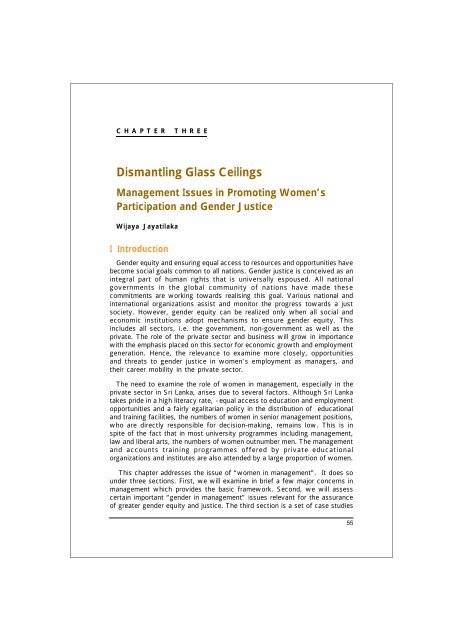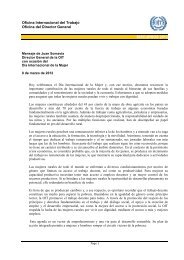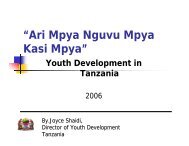Beyond Glass Ceilings and Brick Walls - International Labour ...
Beyond Glass Ceilings and Brick Walls - International Labour ...
Beyond Glass Ceilings and Brick Walls - International Labour ...
Create successful ePaper yourself
Turn your PDF publications into a flip-book with our unique Google optimized e-Paper software.
CHAPTER THREE<br />
Dismantling <strong>Glass</strong> <strong>Ceilings</strong><br />
Management Issues in Promoting Women’s<br />
Participation <strong>and</strong> Gender Justice<br />
Wijaya Jayatilaka<br />
I Introduction<br />
Gender equity <strong>and</strong> ensuring equal access to resources <strong>and</strong> opportunities have<br />
become social goals common to all nations. Gender justice is conceived as an<br />
integral part of human rights that is universally espoused. All national<br />
governments in the global community of nations have made these<br />
commitments are working towards realising this goal. Various national <strong>and</strong><br />
international organizations assist <strong>and</strong> monitor the progress towards a just<br />
society. However, gender equity can be realized only when all social <strong>and</strong><br />
economic institutions adopt mechanisms to ensure gender equity. This<br />
includes all sectors, i.e. the government, non-government as well as the<br />
private. The role of the private sector <strong>and</strong> business will grow in importance<br />
with the emphasis placed on this sector for economic growth <strong>and</strong> employment<br />
generation. Hence, the relevance to examine more closely, opportunities<br />
<strong>and</strong> threats to gender justice in women’s employment as managers, <strong>and</strong><br />
their career mobility in the private sector.<br />
The need to examine the role of women in management, especially in the<br />
private sector in Sri Lanka, arises due to several factors. Although Sri Lanka<br />
takes pride in a high literacy rate, - equal access to education <strong>and</strong> employment<br />
opportunities <strong>and</strong> a fairly egalitarian policy in the distribution of educational<br />
<strong>and</strong> training facilities, the numbers of women in senior management positions,<br />
who are directly responsible for decision-making, remains low. This is in<br />
spite of the fact that in most university programmes including management,<br />
law <strong>and</strong> liberal arts, the numbers of women outnumber men. The management<br />
<strong>and</strong> accounts training programmes offered by private educational<br />
organizations <strong>and</strong> institutes are also attended by a large proportion of women.<br />
This chapter addresses the issue of “women in management”. It does so<br />
under three sections. First, we will examine in brief a few major concerns in<br />
management which provides the basic framework. Second, we will assess<br />
certain important “gender in management” issues relevant for the assurance<br />
of greater gender equity <strong>and</strong> justice. The third section is a set of case studies<br />
55
















